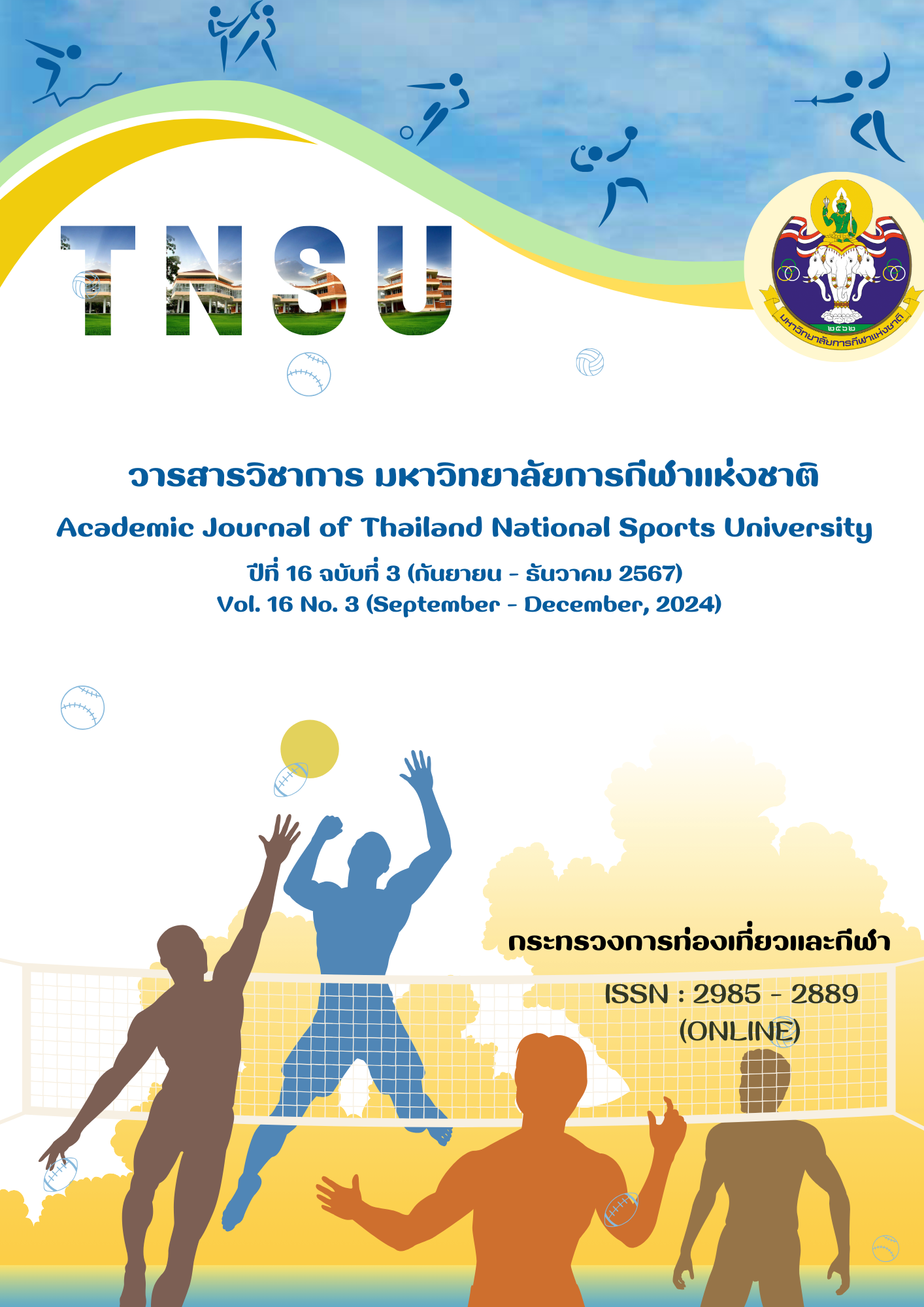THE EFFECT OF THE PHYSICAL ACTIVITY IN SPORTS AND RECREATION PROGRAM BY "TEACH LESS, LEARN MORE" OF POLICY ON IMPROVING EMOTIONAL INTELLIGENCE OF GRADE 4 - 6 STUDENTS
Main Article Content
Abstract
This research aimed to analyze the effect of a program of physical activities (sport and recreational) according to teach less, learn more policy on Emotional Intelligence (EI) among Grades 4 - 6 students. The study included 72 Grades 4-6 students of Wat - Pichaiyaram School during the academic year 2018. EI of students was assessed with the Emotional Intelligence Assessment for Children aged 6-11 years of the Department of Mental Health, Ministry of Public Health. The pretest EI questionnaires rank EI scores to alternate scores to pick, which were selected by matching sampling and then divided into an experimental group and a control group (36 people per group). While the control group was given regular activities, the experimental group engaged in the physical activities (sport and recreational) program according to teach less, learn more policy. The developed program consisting of 24 sessions of sports and recreational activities was carried out in 8 weeks, each time of activities arrangement involved four procedures, namely: (1) building the perception of the rules, (2) specifying the work plan and starting the operation, (3) reflecting results of the processes, and (4) assessing the outcomes. The data were analyzed by the mean, standard deviation. t-test dependent and t-test independent.
The main findings showed that after participating, the control group had indifference in overall EI scores before participating. While the experimental group had significantly higher in overall EI scores than before the participating, and when comparing the EI scores in both groups, the experimental group had significantly higher overall EI scores than the control group at level 0.05. The research results indicate that the developed program efficiently improves the EI of Grades 4 - 6 students.
Article Details

This work is licensed under a Creative Commons Attribution-NonCommercial-NoDerivatives 4.0 International License.
The published article is a copyright of the Academic Journal of Thailand National Sports University. The passage appeared in each article in this academic journal is a perspective of each author which is not related to the journal. Each author is required to be responsible for all components of his/her own article. If there are any mistakes, each author must be responsible for those mistakes on his/her own.
References
Acebes-Sánchez J., Diez-Vega I., Esteban-Gonzalo S., Rodriguez-Romo G. (2019). Physical activity and emotional intelligence among undergraduate students: A correlational study. BMC Public Health, 19, 1–7. doi: 10.1186/s12889-019-7576-5.
Bar-On, R. (1997). Emotional quotient inventory (EQ-i): Technical manual. Toronto, Canada: Multi-health Systems.
Brackett, M. a. (2014). Transforming students’ lives with social and emotional learning. In R. a.-G. Pekrun, International handbook of emotions in education. (pp. 368-388). New York, New York, Routledge.
Cronbach, L. J. (1970). Essentials of psychological testing. New York: Harper & Row.
Goldstein, S. (2017). EQ is massively more important than IQ for leaders. Here’s why. Retrieved from www.inc.com/steve-goldstein/qu-is-massively-more-important-than-iq-for-leaders-heres-why.html
Goleman, D. (1998). Working with emotional intelligence. New York: Bantam Books.
Goleman, D. (2006). Social intelligence: The new science of human relationships. New York: Bntum Books.
Jorge Acebes-Sánchez, Cecilia Blanco-García, Ignacio Diez-Vega, Daniel Mon-López, & Gabriel Rodriguez-Romo. (2021). Emotional intelligence in physical activity, sports and judo: A global approach. International Journal of Environmental Research and Public Health, 18(16), 86-95.
Khaleel Shaik. (2022). Why emotional intelligence is more important than IQ. Retrieved from https://www.businessballs.com/building-relationships/emotional-intelligence-eq/
Laborde S., Guillén F., & Watson M. (2017). Trait emotional intelligence questionnaire full-form and short-form versions: Links with sport participation frequency and duration and type of sport practiced. Personality and Individual Differences, 108, 5 - 9.
Ministry of Education. (2018). A guide to time study management "moderate class, more knowledge". Office of Academic Affairs and Educational Standards Office of the Basic Education Commission.
Dongoran, M. F., Fadlih, A. M., & Riyanto P. (2020). Psychological characteristics of martial sports Indonesian athletes based on categories art and fight. Enfermería Clínica, 30(4), 500-503.
Riyanto, P., Syamsudin, & Sanjaya, P. M. D. (2020). Youth sports activities on emotional intelligence. Advances in Social Science, Education and Humanities Research, 473, 409-412.
Riyanto, P., Betaubun, P. (2019). Effect of student learning model on emotional intelligence. International Journal of Management, 10(6), 54–60.


